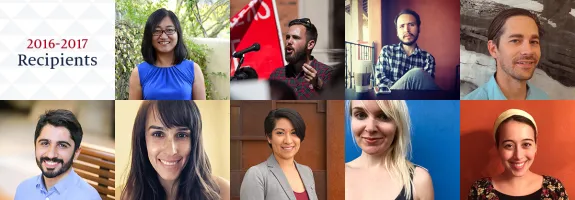
From left to right, top to bottom: Dongchen Hou, Alex Karaman, Christian Ruvalcaba, Jonathan Marquis, Emrah Karakus, Maria Montenegro, Sonia Arellano, Elizabeth Kinnamon, Elizabeth Bentley
The graduate fellows continue the Confluencenter's tradition of challenging disciplinary boundaries while addressing critical issues across the humanities, social sciences and arts. With $45,000 awarded to nine scholars, our graduate fellows program is advancing research in the fields of social justice, inequality, climate change, art, culture, music, queer studies, language and more.
Activist Quilters & the Migrant Quilt Project
English doctoral student Sonia Arellano's project investigates how migrant quilt projects raise awareness about migrant deaths in the Tucson community. She will display her own quilt project at an annual conference in Mexico City, and organize a symposium that brings together quilter-activists to discuss how communities can effectively address social justice issues related to migration. Read more about the project in this Arizona Daily Wildcat article.
Remixing Youth Visions, Reimagining Coalitional Futures: Arts-Based Inquiry as a Participatory Practice for Just Peace in Israel/Palestine
Elizabeth Bentley, a doctoral student in English, is working to create a social-justice oriented, arts-based project involving shared artworks by Israeli and Palestinian youth that envision a just peace across differences. By working with Creativity for Peace, a non-profit that offers leadership training to Israeli and Palestinian women, Bentley will teach participants how to use photography as a way to engage in peace-building initiatives.
From Brush-tips to Machine Arms: Mapping Chinese Writing's Figural Appearance in Media
East Asian Studies doctoral student Dongchen Hou considers Western and Chinese theories of writing to discover more about the dynamics of the human body in Chinese writing. Hou studies Chinese writing's figural appearance and its gestural significance and embodiments in media. This project argues that the body can be a site where relations among writing systems and cultural knowledge intersect.
Unruly Archives: Historicizing the Experiences of Queer Communities during Urban Transformation in Turkey
Gender and Women's Studies doctoral student Emrah Karakus explores the effects of urban transformations on queer communities in Turkey. After conducting an oral history project and archival research that traces the emergence of these repressive policies, this project will culminate in a website that raises awareness of how these redevelopment policies impact queer communities.
Identity Formation and Hip-Hop Music in Modern Palestine
Alex Karaman, Gender and Women's Studies doctoral student, uses an interdisciplinary approach to study the connections among hip-hop music production and listenership and Palestinian identity formation. Through on-site research with consumers and producers of hip-hop music in Israel and Palestine, Karaman accounts for how hip-hop music production and consumption relates to Palestinian identity formation.
Meditechion: Mindfulness and Technology in the San Francisco Bay Area
Elizabeth Kinnamon, Gender and Women's Studies doctoral student, examines how the Buddhist-inspired practice of mindfulness has impacted the Silicon Valley tech industry. Through interviews and participant observation, Kinnamon will investigate how tech workers and members of Bay Area Buddhist meditation centers see the intersections and inherent discord between mindfulness techniques and tech culture.
Like a Glacier
MFA student Jonathan Marquis creates a multimedia art exhibition that situates the scientific, data-driven climate discussion into the felt experience of being in glaciated wilderness areas. Relying on first-hand observations and interactions with field experts, this project will foster discourse between abstract climate data and a perceptual, empathetic sense of agency within wild, glacial places. Learn more Johnathan Marquis on his website.
The Petro-Narcosphere: Cultural Narratives of Oil and Drugs in the U.S.-Mexico Border
Maria Montenegro, doctoral student in Spanish and Portuguese, examines the relationships between two of the goods that supply consumer lifestyles in Mexico and the U.S. By analyzing the two as substances that characterize U.S.-Mexico relations, this project develops an understanding of how consumers interpret the cultural space created by the relationship between oil and drugs.
Maria organized an art exhibit, "Negra Sangre," in conjunction with her project at the Sculpture Resource Center April 22-May 6, 2017.
Language Capital Project
Second Language Acquisition and Teaching doctoral student Christian Ruvalcaba maps where native speakers of non-national languages work and gather in order to encourage the unity and growth of minority language communities. After locating non-national language hubs in Tucson, Ruvalcaba has created a website that locates these spaces, enabling non-national language speakers to find where fellow speakers reside, work, or gather. Visit the website, and learn more in this UA News article.

